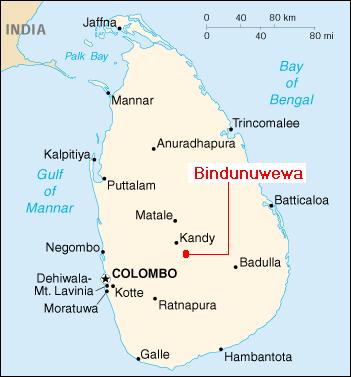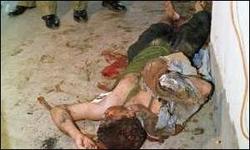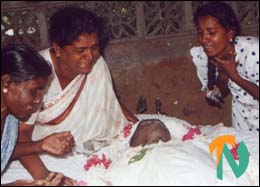-
BindunuwewA
Massacre - 24 October 2000
Tamil Detainees murdered in custody, yet
again...

AFP reported on 25
October 2000:

| "Mobs stormed a rehabilitation
centre in central Sri Lanka Wednesday and beat to death 24 Tamil
inmates in an orgy of violence that also left another man dead, police said.
Hundreds of people, from the majority Sinhalese population, attacked inmates
with knives, sticks and stones, police said...
State radio said the inmates had tried to take over the facility on Tuesday,
triggering tension, and that the army had been called in to restore order.
Defence ministry spokesman Sanath Karunaratne said troops sent to the centre
had withdrawn around midnight but rioting had broken out again on Wednesday
morning. There were reports the inmates had been provoking local residents,
police said." |
At the same time, AFP also reported
| "At no time there were any
incidents among the detainees and the management," (President) Kumaratunga
said in a statement. "There were no incidents with the neighbours either." |
The contradictory statements by the Sri Lanka authorities serve to reveal the
hand of the Sri Lanka security forces in the attack on the Tamil detenus. On 24
October 2000, the Tamil detenus, after several months of detention, had informed
the authorities that they would go on a hunger strike if they were not released.
The Sri Lanka Ministry of Defence runs the rehabilitation centre. The attack
came a few hours after the military, which provided protection to the centre was
removed.
On the one hand, the State radio said that
'the inmates had tried to take over the facility on Tuesday, triggering tension,
and that the army had been called in to restore order'.
Defence ministry spokesman Sanath Karunaratne then added 'troops sent to the
centre had withdrawn around midnight but rioting had broken out again on
Wednesday morning.' And the police suggested 'there were reports the inmates had
been provoking local residents'.
But all that left unanswered the question as to why the military was
withdrawn.
Caught between a rock and a hard place in having to explain the withdrawal of
the military, President Kumaratunga prevaricated - and contradicted the
statements made her own Defence Ministry spokesman. She asserted that "at
no time there were any incidents among the detainees and the management.
There were no incidents with the
neighbours either". President Kumaratunga attempted to imply that a
military presence was unnecessary. She preferred to dismiss the incident as
caused by 'external sources' - sources which she does not identify. And
she then sought to divert international attention by ordering the arrest of
hundreds of villagers involved in the attack, whilst the evidence establishes
her own culpability and the involvement of her own Defence Ministry.
The harsh political reality is that it was no accident that the military was
withdrawn, and that within hours the genocidal attack on the Tamil detainees was
launched - genocidal, because these Tamil detainees were murdered for no reason
other than that they were Tamils.
Liberation Tigers of Tamil Eelam stated in a Press Release on 26 October
2000:
"The Liberation Tigers of Tamil Eelam (LTTE) accuses the government of
Chandrika Kumaratunga of being responsible for the gruesome killing of 30
innocent Tamil political prisoners and seriously injuring 50 others at a
detention centre in Bandarawella, Southern Sri Lanka.
"We have evidence to believe that Sri Lankan security personnel - the army,
police and prison officials - were involved in organising, mobilising and
instigating gangs of Sinhala thugs to commit this heinous crime. Sinhalese
prison officials of the area facilitated riotous Sinhala mobs numbering more
than two thousand persons to storm into the detention centre and brutally
slaughter the Tamil youths with knives, swords, axes and iron bars.
"The victims of this savagery are not members of the LTTE nor are they
surrendered 'child soldiers'. They are innocent Tamil youth arrested on
suspicion and detained without trial under the notorious Prevention of
Terrorism Act. These young detainees have been protesting against their
unjust arrest and demanding release.
"It is a well documented truth that Sri Lankan State authorities are
responsible for several incidents of massacre and extra-judicial killings of
Tamil prisoners in well guarded prisons. The
savage massacre of 53 Tamil political prisoners at the Welikade prison
during July 1983 riots was an internationally known incident. The mass
murders of defenceless Tamil prisoners have become a regular manifestation
of a devious genocidal policy advanced by the Sinhala state against the
Tamil people. The government of Sri Lanka should bear total responsibility
for the serious consequences that might arise from continuing such genocidal
assaults on innocent Tamil detainees.
"We call upon the international human rights organisations to condemn such
barbarous killings in strong terms and use their good offices to pressurise
the government of Kumaratunga to release immediately thousands of innocent
Tamil youths lingering, without trial, in various detention centres and
prisons in the Sinhala south." |
The Tamil Centre for Human Rights
TCHR issued an Urgent Action Appeal (Ref: AE/10/10) on 25 October
2000:
"This morning at 5.00a.m. local time, around 2000 Sinhala
thugs stormed a rehabilitation centre in Bindunuwewa, housing more than 50
Tamil detainees, wielding knives, machetes, axes and iron rods. They hacked
to death 24 defenceless Tamil political detainees and then set fire to the
whole centre. 16 detainees were seriously wounded and a further seven were
injured. 20 detainees are still missing! Bindunuwewa is in Bandarawela
district, in the central part of Sri Lanka.
The police on duty took no serious action to stop the
violence. They called the army base, 15km away. By the time the (army)
"rescue team" arrived, two hours later, the horrific incident was over. The
BBC reported defence forces as saying that the incident could not have been
carried out without the tacit consent of the security forces. Recently,
posters have been displayed prominently in the area inciting racial hatred
and violence against the Tamils.
The centre was run by the National Youth Service Council. The
young Tamil people housed there have been arbitrarily arrested under the
draconian Prevention of Terrorism Act and the Emergency Regulations.
Thousands of such arrests take place in the south of the island. Human
Rights organisations have denounced the PTA and ERs as facilitating torture
and the violations of non-derogable rights such as the right to life.

The UN International Covenant on Civil and Political Rights
(ICCPR), to which Sri Lanka acceded in 1980, states in Article 9(2) that
persons arrested should receive prompt notification of reason for arrest and
any charges made against them. Article 9(3) states that they should be
promptly brought before a judge and brought to trial or released. ER20, the
Emergency regulation pertaining to Rehabilitation orders grossly and
massively contravenes both these international human rights standards.
The Tamil youths who were in the centre were mostly under 19
years old. These detainees, arrested under the PTA had been planning to hold
a hunger strike demanding that they be either charged or released...."
|

 INDICTMENT
AGAINST SRI LANKA
INDICTMENT
AGAINST SRI LANKA